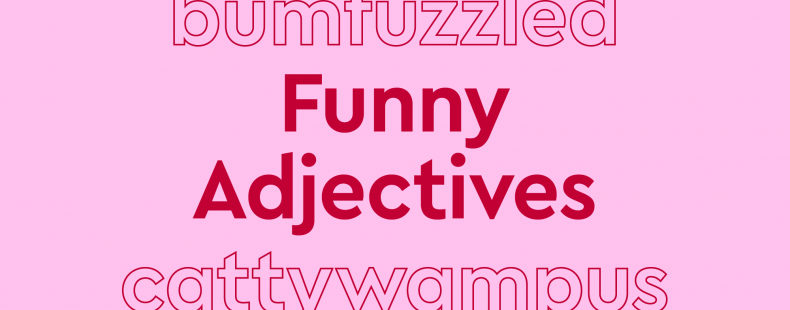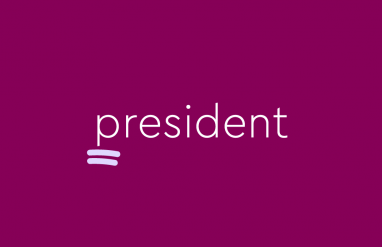There are adjectives in English that are just plain funny. They sound peculiar, look odd on the page, and some even have rhyming schemes that make them seem like mini nursery rhymes. To learn about some adjectives that are droll, amusing, or at the very least diverting, read on. We’ve compiled a list of 17 unusual adjectives that may elicit a chuckle or two.
But what about the word funny itself? Funny has a variety of meanings including “comical; amusing” (not to be confused with the adjective fun, meaning “of or relating to enjoyment or playfulness”). Some synonyms for funny include:
- hilarious
- merry
- silly
- amusing
- diverting
- entertaining
- comical
- whimsical
- droll
- riotous
- jocular
- waggish
- hysterical
- antic
- risible
- side-splitting
Now on to 17 adjectives that are too funny for words:
supercalifragilisticexpialidocious
One of the examples par excellence of a funny adjective is supercalifragilisticexpialidocious [ soo-per-kal-uh-fraj-uh-lis-tik-ek-spee-al-i-doh-shuhs ]. The word was popularized in the 1964 film Mary Poppins, which features a song by the same name. This silly nonsense word is used to describe something “great” or “extraordinary.” It is one of the words on our list specifically designed to be funny. For example: Mint chocolate chip ice cream is supercalifragilisticexpialidocious; it’s delicious.
scrumtrulescent
Another word that was deliberately coined to be humorous is scrumtrulescent, a slang term meaning “transcendent and fantastic beyond description.” The word was coined on the television sketch show Saturday Night Live, where it was used by Will Ferrell to describe the performance of an actor. It is likely that scrumtrulescent was inspired by a combination of the word scrumptious, meaning “very pleasing; delectable” and the suffix -escent, which typically denotes an adjective relating to the beginning of an action or process. For example: As one of the best players for Paris-Saint Germain, Neymar’s performance on the pitch is nothing short of scrumtrulescent.
cromulent
Yet another funny neologism that comes to us from popular television is the word cromulent, meaning “acceptable or legitimate.” This word is often used facetiously, which is to say it is not meant to be taken seriously or literally (ie. sarcastically). Cromulent comes from a February 18, 1996 episode of The Simpsons titled “Lisa the Iconoclast.” In it, “historical figure” Jebediah Springfield says, “A noble spirit embiggens the smallest man.” One of the school teachers then remarks that embiggens is “a perfectly cromulent word.” Both words were created specifically for the episode and the joke.
cattywampus
A word that sounds like it should mean something odder than it does is cattywampus [ kat-ee-wom-puhs ], an informal term from the Midwestern or Southern United States. The word cattywampus is a variant of catawampus, meaning “askew; awry” or “positioned diagonally; cater-cornered.” Believe it or not, the word catawampus was used in the 1800s to mean “a bogy, a fierce imaginary animal.” For example: The picture was cattywampus on the wall, so she went to straighten it.
discombobulated
The word discombobulated is another funny adjective that describes being somewhat off-kilter, much like cattywampus. Discombobulated is an informal term that means “confused, disconcerted, or upset.” Also like cattywampus, discombobulated is of American origin; it is a “fanciful alteration” of discompose or discomfort. For example: Despite being an experienced traveler, Jim always felt discombobulated after going through security.
bumfuzzled
If you’re bumfuzzled [ buhm-fuhz–uhld ], you’re “confused” or “flustered.” This is another excellently humorous adjective from the United States, particularly the Southern United States. For example: We were all bumfuzzled by the cat’s predicament—how did he get in the wall? According to Green’s Dictionary of Slang, bumfuzzled is an American variant of the British slang bamfoozle, which was used as a euphemism for “damn” and later came to mean “to trick, to confuse.”
higgledy-piggledy
As we noted, some of the funniest adjectives in English rhyme (rhymes are naturally funny, for some reason). One example is higgledy-piggledy [ hig–uhl-dee-pig–uhl-dee ], meaning “confused; jumbled.” It is often used to describe scenes of chaos. For example: When the cat leaped, the birds flew off higgledy-piggledy across the rooftop.
loosey-goosey
The term loosey-goosey is another funny term that uses a rhyming scheme. This slang term means “relaxed; calm; unperturbed.” It often has a negative connotation, implying lack of organization or precision. Loosey-goosey comes from the American expression that dates to 1930, loose as a goose, meaning “very loose.” By 1965, the term had been shortened to loosey-goosey. For example: We weren’t trying to go about it loosey-goosey, because it was important to carefully follow all of the instructions.
hoity-toity
The final funny rhyming term we will be looking at in this list is hoity-toity [ hoi-tee-toi-tee ], “assuming airs; pretentious; highfalutin; haughty.” This term has a distinctly negative connotation, implying someone who is a bit of a snob. For example: He took me to a hoity-toity restaurant with white tablecloths and candlesticks on the table on our first date. The expression hoity-toity comes from the now-obsolete verb hoit meaning “to romp, riot, play the fool.”
wabbit
You might think wabbit is just how Elmer Fudd says “rabbit,” but in Scots English, wabbit means “weary; exhausted.” For example: After the competitive footrace, the students were completely wabbit. The word wabbit comes from the earlier wobart which was used attributively to mean “feeble, decayed” and, astonishingly, as a name for anything with a wooly appearance, from long, hairy caterpillars to shaggy cattle.
quagmiry
You may be familiar with the noun quagmire, which literally means “a bog,” but is most often used figuratively to mean “a situation from which extrication is very difficult.” The relatively rare adjective form of this word is quagmiry, which means “of or related to a difficult situation.” For example: I found myself in a quagmiry situation that I could not see any way out of. A more common variant of quagmiry is quaggy, also a bit of a funny word, which means “of the nature of or resembling a quagmire” or “soft or flabby.”
fuggy
Speaking of funny words that end in -y, a British adjective that might sound funny to some is fuggy, which means roughly “smoggy” or “having air that is impure because of smoke, heat, or similar.” The word is the adjective form of the British boarding school slang fug, a noun describing “stale air, especially the humid, warm, ill-smelling air of a crowded room, kitchen, etc.” For example: The pub was fuggy and crowded with people ordering drinks and talking loudly.
piffling
Another funny word that is closely associated with British English, although it is also used in the United States, is piffling, which means “of little worth; trifling; piddling.” The verb piffle itself means “to talk nonsense,” which gives you a sense of the negative connotation of this word. For example: Despite his great wealth, he only gave a piffling amount to charity every year.
bardolatrous
While we are covering funny words from “across the Pond,” we would be remiss not to mention bardolatrous, the adjective form of a word coined by the Irish playwright George Bernard Shaw, bardolatry [ bahr-dol–uh-tree ], or “great or excessive adoration of or reverence for William Shakespeare,” also known as the bard. For example: The actor was known for being irritatingly bardolatrous, breaking into monologues from Hamlet at the drop of a hat.
borborygmic
Some of the strangest and funniest words in English come from the sciences. One such word is borborygmic, which means “of or relating to a rumbling or gurgling sound caused by the movement of gas in the intestines.” For example: The presenter heard an ominous borborygmic noise, and she ran toward the bathroom. As the bard himself was fond of pointing out, flatulence is very funny (Shakespeare even has Hamlet himself blowing a raspberry in Act II), and borborygmic itself is a funny-sounding term.
syzygal
Another term that is scientific but sounds pretty funny nonetheless is syzygal [ siz-i-jal ], meaning “of or relating to the alignment of three celestial objects, as the sun, the earth, and either the moon or a planet.” This term is also used in prosody, or poetry analysis, to describe a group or combination of two feet. Here is an example of how the word might be used in astronomy: We can see the syzygal line of the sun, moon, and Mars through observation with a telescope on certain days of the year.
redonkulous
Our final term is a slang term that has yet to make it into the dictionary officially, although it has been attested to since at least 2004: redonkulous. The word is a fanciful alternation of ridiculous, and it emphasizes the extreme degree to which something is absurd or ridiculous. For example: That redonkulous plan would never work!
Take the quiz
If you enjoyed these silly terms, you can review them all at our word lists here: 14 Words That Mean Funny and Silly Words That Might Make You Laugh. And, when you’ve finished laughing, you can test your knowledge of these funny adjectives with our hilarious, slightly redonkulous quiz here.













